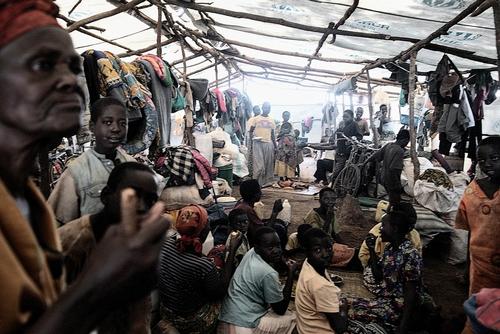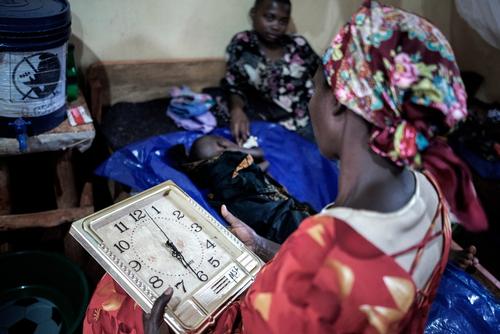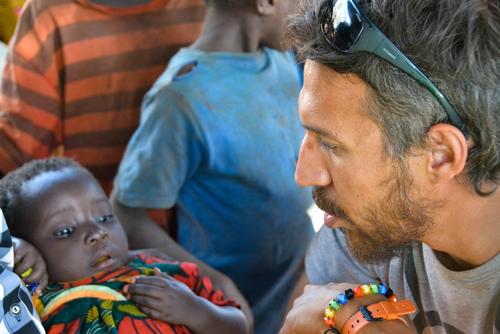Dr Alfonso Apollinar, from Mexico, is part of MSF’s emergency team responding to the refugee crisis in Tanzania, where more than 118,000 Burundians have fled to camps across the border.
“I’ve been in Tanzania since May, when refugees from Burundi first started crossing the border to escape political instability and violence in their country. In the course of just three months, 100,000 people arrived.
The first to arrive were those who had enough money to be able to flee easily when the conflict broke out. Mostly women and children, they came with at least a few possessions – some clothes and some cooking pots – and moved into school buildings. Schools had to stop their classes.
With no more room in the schools, the second wave of people moved into mass shelters in Nyarugusu camp, which already housed refugees from Democratic Republic of Congo.
There were some cases of cholera at the border, so to prevent the disease spreading to the camp, we quickly started vaccinating people, and we also set up a cholera treatment centre. Our efforts to stop transmission were successful, and inside the camp there was no outbreak. We also treated children for malnutrition and ran mobile clinics to provide the refugees with general healthcare.
It’s a beautiful region – the camp is surrounded by mountains covered in trees and lots of vegetation. Right now it’s the rainy season – it rains every day, local people are planting their crops and everything is getting greener. But despite the beauty, living conditions in Nyarugusu camp are very tough.

The mass shelters are made of logs covered with plastic sheeting, each one about 40m by 10m. Two hundred people stay in each shelter – a lot of people for the space. The reality is that people live in the open during the day, and sleep inside the shelters at night, on mats on the ground. It’s very difficult to use mosquito nets in these conditions and malaria is a big problem.
Our medical teams also see many people with chronic respiratory infections. When I first arrived it was the dry season, and the camp was covered by a big cloud of dust. It was tough for the refugees, and tough for our teams to work there too.
We also see lots of patients with diarrhoea because of the unhygienic conditions. The latrines are a problem in the camp – with so many people using them, they get smelly and dirty very quickly. Some people have skin problems, and we see lots and lots of pregnant women.
As Nyarugusu became increasingly crowded, food and water became a problem, and there were tensions between the Burundians, who had just arrived, and the Congolese, who had been there for years.
In early October a new camp was opened two hours away, called Nduta, while by the end of December, there should be a third camp.
Nduta is sheltering the third wave of refugees. Now we are seeing more and more single mothers whose husbands have been trapped or killed in Burundi. It’s getting harder to travel, so few older people are attempting the journey.
MSF is the only medical organisation working in Nduta. We’ve set up mobile clinics, and we are building a hospital. So far it has an outpatient department, an emergency room, and a ward with 14 beds and two intensive care beds – all of which are already full.

Conditions in Nduta are slightly better than in Nyarugusu, because there are more family tents and people have more space. Currently there are 30,000 people here, but the plan is to have 50,000.
Most of the inpatients have severe pneumonia, malaria or dehydration, but there are also pregnant women with infections. We have also just opened the maternity department and the women’s ward, and will soon open the men’s and children’s wards. When it’s finished, the hospital will have 50 beds, with enough space for 80 beds if needed.
Last week a two-month-old baby was brought in with suspected pneumonia. We discovered he also has a heart problem that needs surgery. In Europe this would be a relatively minor procedure, but here we don’t have the equipment or surgical capacity, so we are trying to find a hospital that can treat him.
We are also vaccinating children, and doing water and sanitation activities in the camp – setting up a water purification system to make river water drinkable, and ensuring there is enough clean water to go around.
Nduta camp hasn’t been built from scratch – it used to be a refugee camp, but was closed ten years ago. The sad fact is that many of these people have been refugees for much of their lives, moving backwards and forwards between countries in the region. Some of the new arrivals in Nduta camp tell me they were born here. People cope with these tough living conditions because often they haven’t known anything else.”
MSF began working in Nyarugusu camp in May 2015 in response to the mass influx of refugees from Burundi. MSF currently works alongside the Tanzanian Red Cross in Nyarugusu camp, running an inpatient therapeutic feeding centre and an outpatient feeding programme for malnourished children, as well as running mobile clinics across the camp. MSF is also providing around 500 cubic metres of water per day in the camp.
In Nduta, MSF is carrying out mobile clinics, running a hospital, and has also provided 2,000 tents. Last week, MSF carried out 1670 outpatient consultations, and admitted 78 patients to its hospital. Teams are also supplying 200 cubic metres of water per day.



